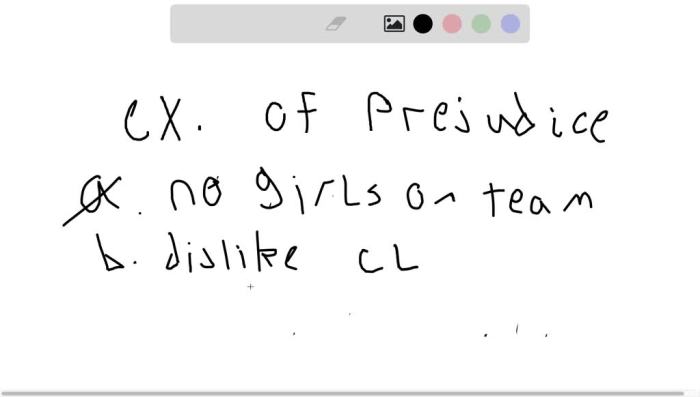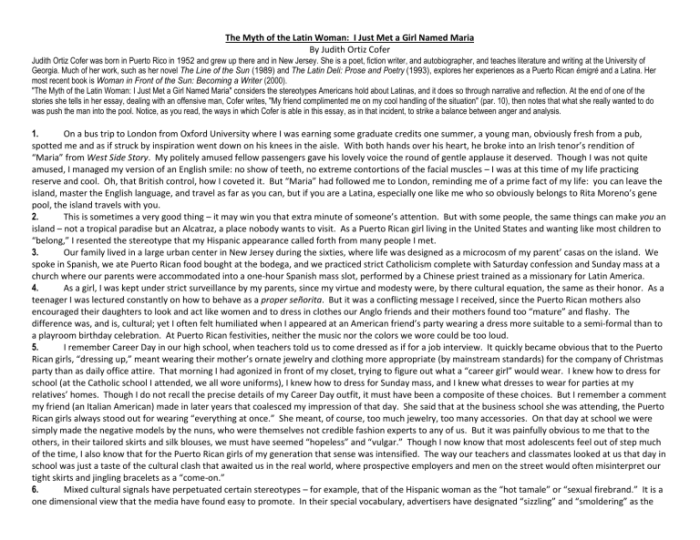The myth of the latin woman by judith ortiz cofer – Judith Ortiz Cofer’s “The Myth of the Latin Woman” confronts the pervasive stereotypes that have long defined and limited Latin women. Through personal narratives and incisive analysis, Cofer challenges these reductive portrayals, revealing the diverse and multifaceted nature of Latin womanhood.
Cofer exposes the harmful consequences of these stereotypes, which have hindered opportunities, reinforced discrimination, and perpetuated a narrow and distorted view of Latin women in society.
Introduction

In her essay “The Myth of the Latin Woman,” Judith Ortiz Cofer challenges the pervasive stereotypes associated with Latin women and advocates for a more nuanced and inclusive understanding of their identities and experiences.
Cofer’s essay is a powerful and insightful exploration of the ways in which stereotypes can limit and oppress marginalized communities. Through personal anecdotes, historical analysis, and literary examples, she argues that the myth of the Latin woman is a harmful construct that perpetuates inequality and discrimination.
The Stereotypical Latin Woman: The Myth Of The Latin Woman By Judith Ortiz Cofer

The stereotypical Latin woman is often portrayed as a hypersexualized, submissive, and domestic figure. These stereotypes are deeply rooted in colonial and patriarchal ideologies that have historically objectified and marginalized women of color.
In popular culture, Latin women are often depicted as fiery, exotic, and sexually available. This portrayal reinforces the idea that Latin women are objects of desire and consumption rather than individuals with agency and autonomy.
Challenging the Stereotypes, The myth of the latin woman by judith ortiz cofer
Cofer draws upon her own experiences and observations to challenge the prevailing stereotypes of Latin women. She shares stories of strong, independent, and accomplished women who defy the narrow and limiting definitions imposed upon them.
Cofer also highlights the ways in which Latin women have resisted and subverted stereotypes through their art, activism, and scholarship. By creating their own narratives and challenging dominant discourses, Latin women have played a vital role in reshaping the public perception of their community.
The Impact of Stereotypes

The stereotypes associated with Latin women have a profound impact on their lives. These stereotypes can limit their opportunities in education, employment, and social interactions.
Moreover, stereotypes can reinforce discrimination and violence against Latin women. By perpetuating the idea that Latin women are inferior or less deserving of respect, stereotypes create a climate in which they are more vulnerable to harassment, assault, and other forms of abuse.
Redefining the Latin Womanhood
Cofer’s essay calls for a redefinition of Latin womanhood that goes beyond the confines of stereotypes. She argues that Latin women are diverse and complex individuals who defy easy categorization.
According to Cofer, a redefined Latin womanhood is one that embraces strength, intelligence, and agency. It is a womanhood that is not defined by others but rather by the women themselves.
Frequently Asked Questions
What is the main argument of “The Myth of the Latin Woman”?
Cofer argues that the stereotypical portrayal of Latin women as submissive, exotic, and hypersexualized is a harmful myth that perpetuates discrimination and limits opportunities.
How does Cofer challenge these stereotypes?
Cofer draws on her own experiences and observations to demonstrate the diversity and complexity of Latin women’s identities. She highlights their resilience, strength, and agency in resisting and subverting these stereotypes.
What are the negative consequences of these stereotypes?
Stereotypes can lead to discrimination in employment, education, and other areas of life. They can also reinforce harmful gender roles and limit women’s self-expression and opportunities for personal growth.